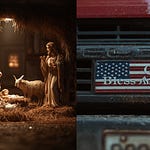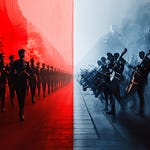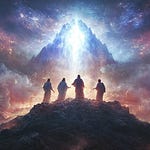This video is the first in a four-part series examining how American civil religion, once a unifying force, now contributes to our division.
Let's talk about nationalisms. What are they? Why do they matter?
I think the best way to understand nationalisms is to consider families.
Think about a family with many children and the different stories that children, even as they grow into adults, may tell about what it means to be a member of that family. What were mom and dad like? What values were taught? And whether or not they had gotten a fair deal at the table.
Depending on how they tell that story, they may have different practices and ethics and behave differently, even though they come from the same family.
The stories we tell about who we have been as members of a family matter in terms of our ethics.
And so, too, and in a very similar way, do the stories we tell about our peoplehood - our national identity - and what it means for us to be American.
If we tell a rightly ordered story, then our ethics as Americans and how we treat and love each other will be rightly ordered.
And if we tell untruthful stories that omit both our sins of omission and commission and our great achievements, well, our ethics, too, can be disordered.
They are very similar things: we tell stories around the table about our family lives and our lives as a community.
If the stories we tell about our lives put us in the role of victim, if they put us in the role like Cain did in the story of Cain and Abel, as the one who was victimized because all the glory, all the love went to one and not to the other, then we might often tell stories about impossibility: how it's impossible for us ever to flourish unless we resort to power, unless we resort to dynamics that would lead to the destruction of others. Or the subjugation of others, or ultimately, the subjugation of ourselves.
Of course, Cain told stories of victimhood, how he had not benefited as much as his brother, and he used those to justify his actions.
He slew his brother. And, of course, the rest is history. It determined who he would become.
Cain and Abel is one of the great stories from Scripture that reminds me of disordered nationalism. Cain’s version is a story we tell that puts us in the victim position.
But another one that comes to mind is pertinent here in the United States. That's the story of the two prodigal sons.
Most of us will think of the prodigal son as the younger brother. But there were two brothers. The story of the Prodigal Sons is a story of a younger brother who received and demanded, actually, his inheritance and went and wasted all the gifts that his father had given him in pursuing a life that was not worthy of himself.
He ultimately reached a point of no return - of the abyss - went home and was welcomed home by his father.
For me, the critical point here is not the younger brother's behavior but that of the older brother.
When the older brother saw that his younger brother, who had been so wasteful, was welcomed with extraordinary grace—that his father slayed the fatted calf and gave him a feast—he couldn't handle it.
And he, too, put himself in the place of a victim. Life was not fair.
The younger brother was given the privilege that was due him. And it was not fair. It was unjust. And so he was filled with resentment.
We can tell stories that put ourselves in the place of victims. Inevitably, this leads us to stories about ourselves that will shape our ethics in a disordered way. We will not become the people we were called to be.
That happens with us as individuals, and it happens to us as nations.
So we can tell many kinds of stories as a people, and the ones we accept matter immensely to us—to whether we will become the people we're called to be and, as James Baldwin put it, achieve our country.











